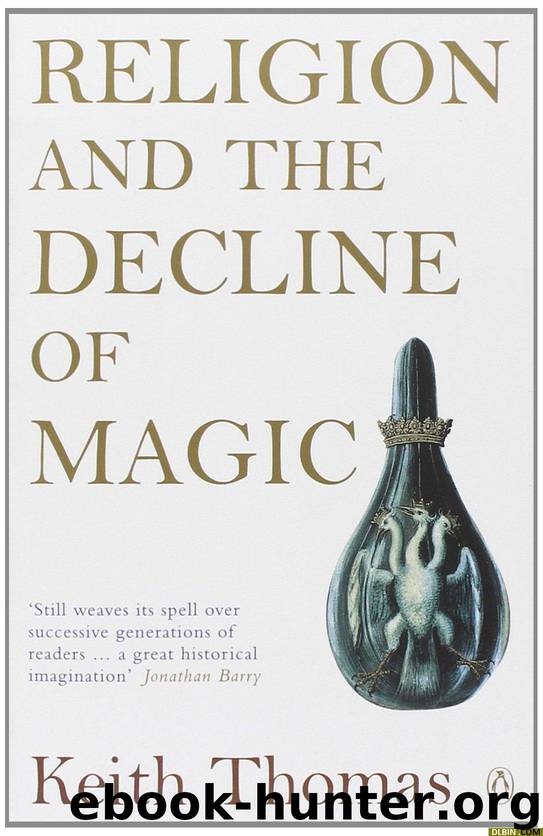Religion and the Decline of Magic by Keith Thomas

Author:Keith Thomas [Thomas, Keith]
Language: eng
Format: epub, pdf
Tags: Non-Fiction, Gnostic Dementia, Cultural Anthropology, 20th Century, Religion, v.5, Amazon.com, Religious Studies, Cultural History, History
ISBN: 9780140137446
Google: zPfbibaK_NwC
Amazon: 0140137440
Barnesnoble: 0140137440
Goodreads: 314105
Publisher: Penguin Adult
Published: 2015-05-30T16:00:00+00:00
16.
THE MAKING OF A WITCH
They themselves, by the strength of fancy, may think they bring such things to pass which many times unhappily they wish for and rejoice in when done, out of the malevolent humour which is in them: which passes with them as if they had really acted it.
Arthur Wilson, 1645
(F. Peck, Desiderata Curiosa [1779], p. 476)
Loath they are to confess without torture, which witnesseth their guiltiness.
King James I
(Daemonologie [Edinburgh, 1597], p. 30)
1. Cursing
THE belief that it was possible for one person to do physical injury to another by the mere enunciation of hostile words had a long prehistory. In the Middle Ages the power to bestow God's curse had been claimed by the Church and used as a sanction against many kinds of undesirable behaviour. Papal letters carried an anathema on those who disregarded their contents; charters and deeds concluded with a curse on their violators; the priest who levied his tithes had the power to curse recalcitrants; and even monastic librarians might attach an anathema to each volume as a sanction against thieves and careless borrowers. Four times a year the general sentence of excommunication by bell, book and candle was pronounced against all thieves, murderers and enemies of the Church.1 Laymen could also avail themselves of this ecclesiastical power of malediction. Thus in the late fifteenth century, when Thomas Perne of Gilden Morden, Cambridgeshire, found that he had been robbed, he reported the theft to the vicar, who published it in church and threatened to curse the thieves if the goods were not immediately restored. It was common for the bishops to issue mandates for the excommunication of unidentified offenders who had injured private individuals in this way.2 The aggrieved party himself might even pronounce the malediction, as in 1521, when the Mayor of Lincoln published a formal curse on those who had improperly removed the records and books of the Common Council.3
In Catholic countries such sanctions were maintained by the Roman Church long after the Reformation. In 1628, for example, theft of church silver provoked the Bishop of Barcelona into putting a curse on the land round about, and the subsequent crops were ruined.4 But for Protestants this human bestowal of God's malediction was a blasphemy, for it implied that the priest or the Church could command God himself. It was a magical manipulation of the Almighty's powers which no human being should attempt. Ordinary men were not even allowed to pray for the defeat of their enemies. This was the view of the Lollards, and it was strongly reiterated by the Protestant Reformers.5 The medieval procedure of cursing notorious offenders quarterly was given up in 1534.6 Henceforth no priest could command God in this way; nor was any private individual permitted to call down heavenly wrath upon his enemies. The officers of the Church frequently inquired in the visitations whether any parishioners had been guilty of banning, swearing, or cursing their neighbours or their goods; and the presentment of such cursers was common enough.
Download
Religion and the Decline of Magic by Keith Thomas.pdf
This site does not store any files on its server. We only index and link to content provided by other sites. Please contact the content providers to delete copyright contents if any and email us, we'll remove relevant links or contents immediately.
| Ancient & Controversial Knowledge | Ghosts & Hauntings |
| Hermetism & Rosicrucianism | Magic Studies |
| Occultism | Parapsychology |
| Supernatural | UFOs |
| Unexplained Mysteries |
Animal Frequency by Melissa Alvarez(3764)
Sigil Witchery by Laura Tempest Zakroff(3660)
Real Magic by Dean Radin PhD(3578)
Fingerprints of the Gods by Graham Hancock(3230)
The Rosicrucians by Christopher McIntosh(3059)
Aleister Crowley: The Biography by Tobias Churton(3031)
Journeys Out of the Body by Robert Monroe(3000)
Alchemy and Alchemists by C. J. S. Thompson(2918)
Mysteries by Colin Wilson(2893)
Hitler's Monsters by Eric Kurlander(2741)
John Dee and the Empire of Angels by Jason Louv(2718)
Wicca: a guide for the solitary practitioner by Scott Cunningham(2712)
The Hatha Yoga Pradipika (Translated) by Svatmarama(2504)
Infinite Energy Technologies by Finley Eversole(2497)
Dark Star Rising by Gary Lachman(2427)
The Book of Lies by Aleister Crowley(2389)
Aliens by Jim Al-Khalili(2388)
To Light a Sacred Flame by Silver RavenWolf(2361)
Hitler's Flying Saucers: A Guide to German Flying Discs of the Second World War by Stevens Henry(2306)
